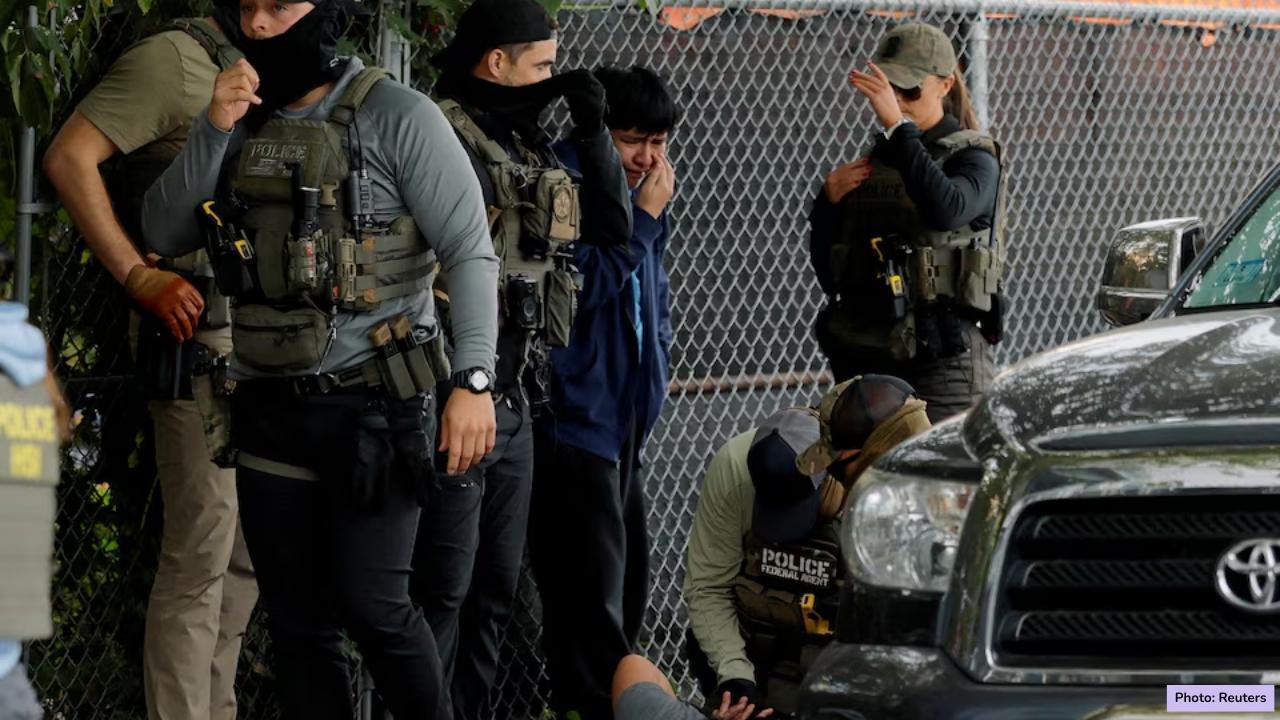
Post by : Monika
In recent weeks, U.S. Immigration and Customs Enforcement, commonly known as ICE, has conducted a series of enforcement operations in several major American cities, including New York, Chicago, and Boston.
These operations have sparked significant public attention, criticism, and protests. Many people, including activists, community leaders, and ordinary citizens, have raised concerns about the methods used by ICE officers during these operations.
ICE is a federal agency under the Department of Homeland Security (DHS), and its primary role is to enforce immigration laws in the United States. This includes identifying and deporting undocumented immigrants, investigating immigration violations, and detaining individuals who are suspected of being in the country illegally. While ICE's work is an official government responsibility, the recent enforcement tactics have drawn criticism for being aggressive and, in some cases, violent.
Incident in New York City
One of the most widely reported incidents occurred in New York City. At a courthouse, an ICE officer was filmed shoving a woman to the ground. The woman, who was reportedly seeking asylum in the United States, fell hard and appeared to be injured. This video quickly spread across social media and news outlets, leading to public outrage. Many people expressed concern that the officer’s actions were unnecessary and violated the woman’s rights.
The Department of Homeland Security responded by stating that the officer involved had been “relieved of current duties” while an internal investigation is underway. Officials emphasized that the situation is being taken seriously and that the agency is reviewing both the specific actions of the officer and the overall procedures for courthouse operations.
Human rights organizations and immigrant advocacy groups in New York called for additional accountability measures, arguing that this incident highlights broader issues in ICE’s enforcement approach.
Protests in Chicago
In Chicago, the situation has escalated even further. Demonstrators gathered outside an ICE detention center to protest the agency’s actions. These protests were met with tear gas and pepper spray, escalating tensions in the city. The protests were sparked, in part, by a recent incident in which an ICE agent fatally shot a man in a Chicago suburb.
The man, Silverio Villegas Gonzalez, was reportedly dropping off his children at school when he was approached by ICE officers. During the arrest attempt, he was shot and later died from his injuries. Gonzalez’s death has led to mourning in his hometown in Mexico and intensified criticism of ICE’s tactics.
Many community members, particularly in immigrant neighborhoods, expressed fear and anger, arguing that ICE’s enforcement methods put ordinary people at risk. Local leaders called for a review of the agency’s use of force policies and for greater transparency in how operations are conducted.
Incident in Boston
In Boston, another troubling incident occurred when a woman was injured during an ICE arrest. Reports suggest that she was a legal U.S. resident at the time. She was taken to the hospital for evaluation after being detained, raising questions about whether ICE officers followed proper procedures. The details of her arrest are still under investigation, but the incident has fueled ongoing debates about the agency’s treatment of individuals during detentions.
Public Response and Community Reactions
Across these cities, public response to ICE’s recent actions has been strong. Citizens, advocacy groups, and community leaders have expressed frustration, fear, and anger at what they perceive as heavy-handed enforcement tactics. Many protests have taken place in public spaces, including outside detention centers, courthouses, and city halls. Demonstrators are calling for reforms that would ensure that immigrants, including those seeking asylum or legal residency, are treated fairly and with dignity.
Activists argue that ICE’s approach disproportionately affects immigrant communities, particularly those from Latin America and other vulnerable populations. Families, including children, are often directly affected by raids and arrests. Critics point out that aggressive enforcement measures can disrupt family life, create trauma, and even endanger the safety of individuals who pose no criminal threat.
Legal and Policy Concerns
The recent incidents have also prompted discussions about the legality of ICE’s tactics. Some lawyers and human rights advocates argue that certain actions, such as the use of force in non-threatening situations, may violate both U.S. law and international human rights standards. Questions have been raised about the adequacy of oversight and accountability within ICE, as well as whether officers receive proper training on how to handle sensitive situations.
Local governments in several cities have begun exploring ways to limit ICE’s authority. For example, some city officials are considering policies that would restrict ICE from conducting operations within certain areas, such as schools, hospitals, and courthouses.
The goal of these measures is to protect the rights and safety of residents while still complying with federal immigration laws. These policies are sometimes referred to as “sanctuary city” protections, which aim to create safer environments for immigrants without providing a legal shield from federal law.
Calls for Immigration Reform
The recent events involving ICE have also sparked broader discussions about immigration reform in the United States. Many advocacy groups are calling for changes to existing immigration laws to ensure that individuals are treated fairly, receive due process, and are not subject to excessive or harmful enforcement measures.
Immigration reform advocates emphasize that the current system often leaves immigrants vulnerable to abuse or unfair treatment. They argue for policies that balance the need for border security with respect for human rights and legal protections. Proposals include clearer guidelines for ICE operations, independent oversight, and stronger protections for families and children.
Impact on Immigrant Communities
Immigrant communities in New York, Chicago, and Boston have felt the direct impact of ICE operations. Many individuals live in fear of detention or deportation, even if they are legally present in the country.
Community members report anxiety, stress, and disruptions to daily life caused by the threat of ICE raids. These fears can affect employment, education, and access to healthcare, creating long-term social and economic challenges.
Community organizations have stepped in to provide support. Legal aid groups are offering guidance on rights during ICE encounters, while social service agencies are helping families affected by arrests. Religious organizations and local nonprofits are also mobilizing to assist immigrants and raise public awareness about the consequences of aggressive enforcement practices.
Federal Government Response
The federal government, through the Department of Homeland Security, has defended ICE’s actions, stating that the agency is carrying out its legal duties to enforce immigration laws.
Officials argue that enforcement is necessary to maintain public safety, uphold immigration laws, and prevent illegal entry or overstays. They also claim that officers are trained to act professionally and with caution during arrests.
However, DHS has acknowledged that some incidents, such as the shoving incident in New York, require further investigation. The agency has stated that corrective measures will be taken if officers are found to have acted inappropriately. ICE also announced that it would review its policies and procedures to prevent similar incidents from occurring in the future.
Looking Ahead
As investigations continue into these incidents, public debate about ICE’s tactics and U.S. immigration policy is likely to intensify. While some citizens support stronger enforcement measures to address illegal immigration, many others advocate for a more compassionate and reform-oriented approach that prioritizes human rights, due process, and safety.
Policymakers are facing pressure to find solutions that balance law enforcement with the protection of individual rights. The outcome of these discussions could shape the future of immigration policy in the United States, influencing both federal enforcement practices and local government regulations.
The recent ICE operations in New York, Chicago, and Boston highlight the complex and often controversial nature of immigration enforcement in the United States. These incidents have exposed tensions between federal law enforcement and community concerns, raising questions about fairness, accountability, and the treatment of vulnerable populations.
Public protests, legal debates, and calls for reform show that immigration enforcement is not just a matter of law but also a social and ethical issue. Communities across the country are demanding that the government ensure humane and just treatment for all individuals, regardless of immigration status.
As ICE continues its work and investigations into controversial incidents proceed, the nation will be closely watching how enforcement policies are implemented and whether reforms will be introduced. The events in these cities underscore the importance of balancing security with human rights and the need for transparency and accountability in government agencies.
ICE Immigration New York



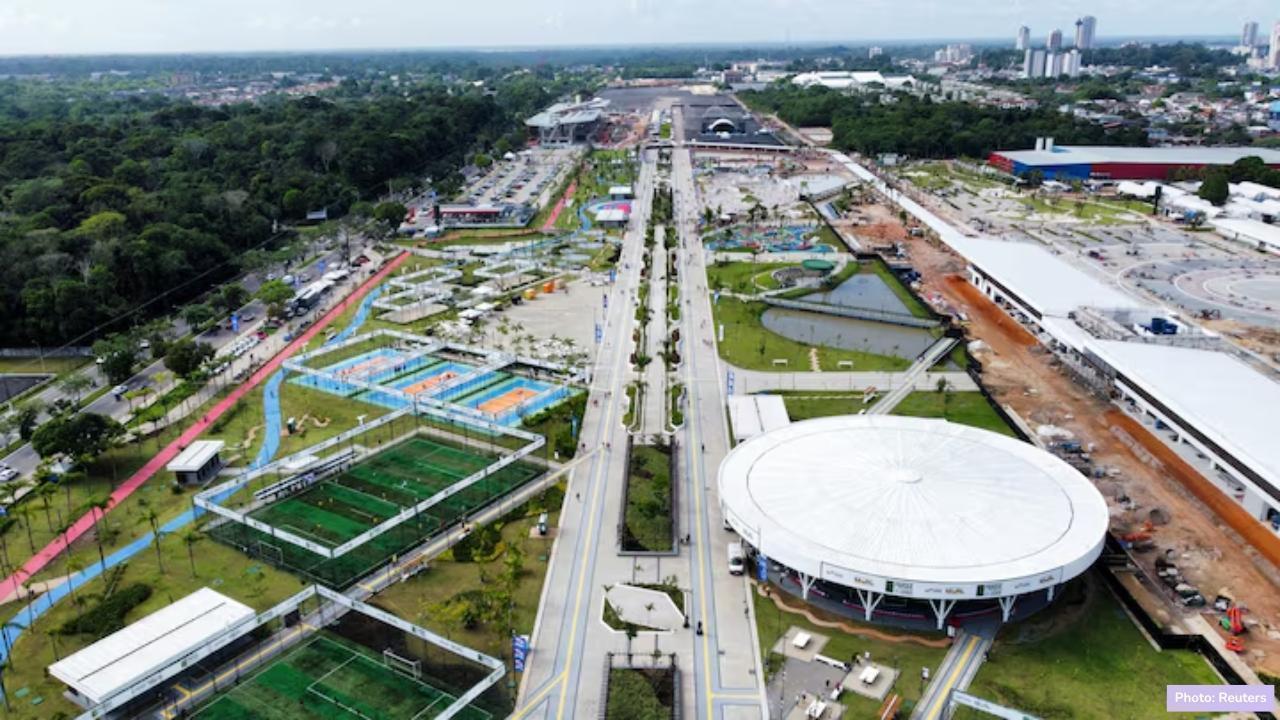

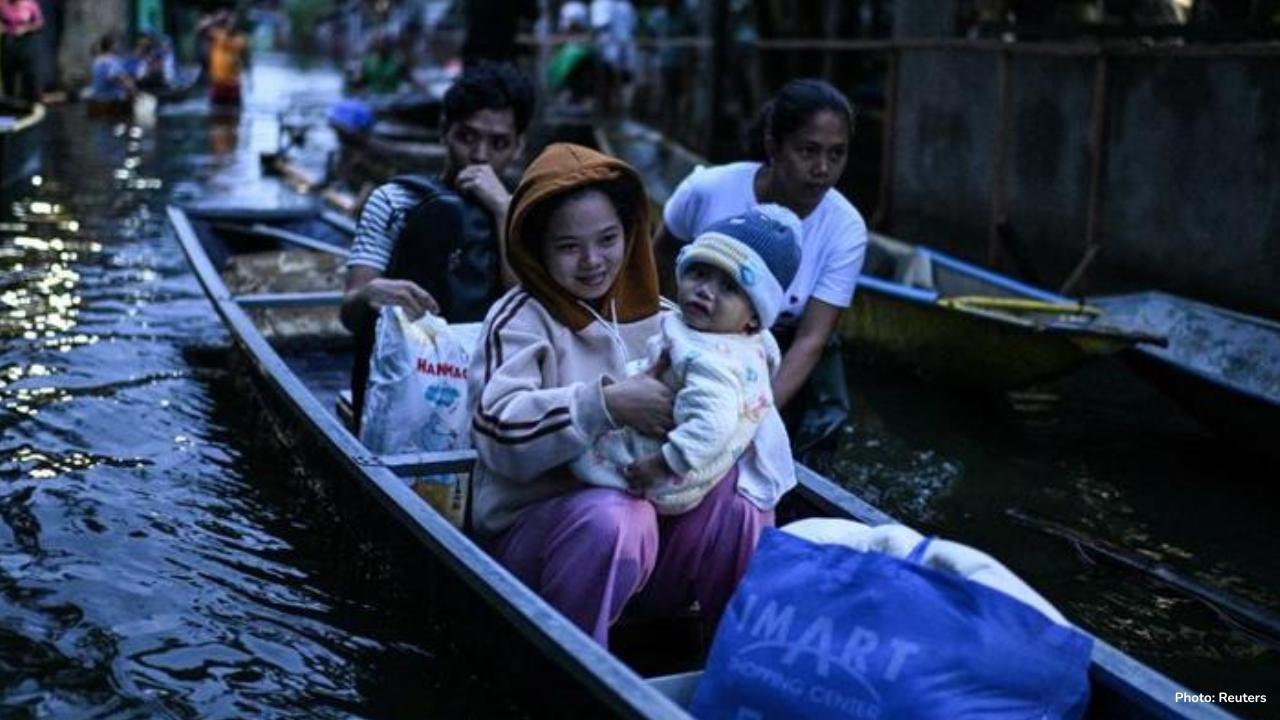

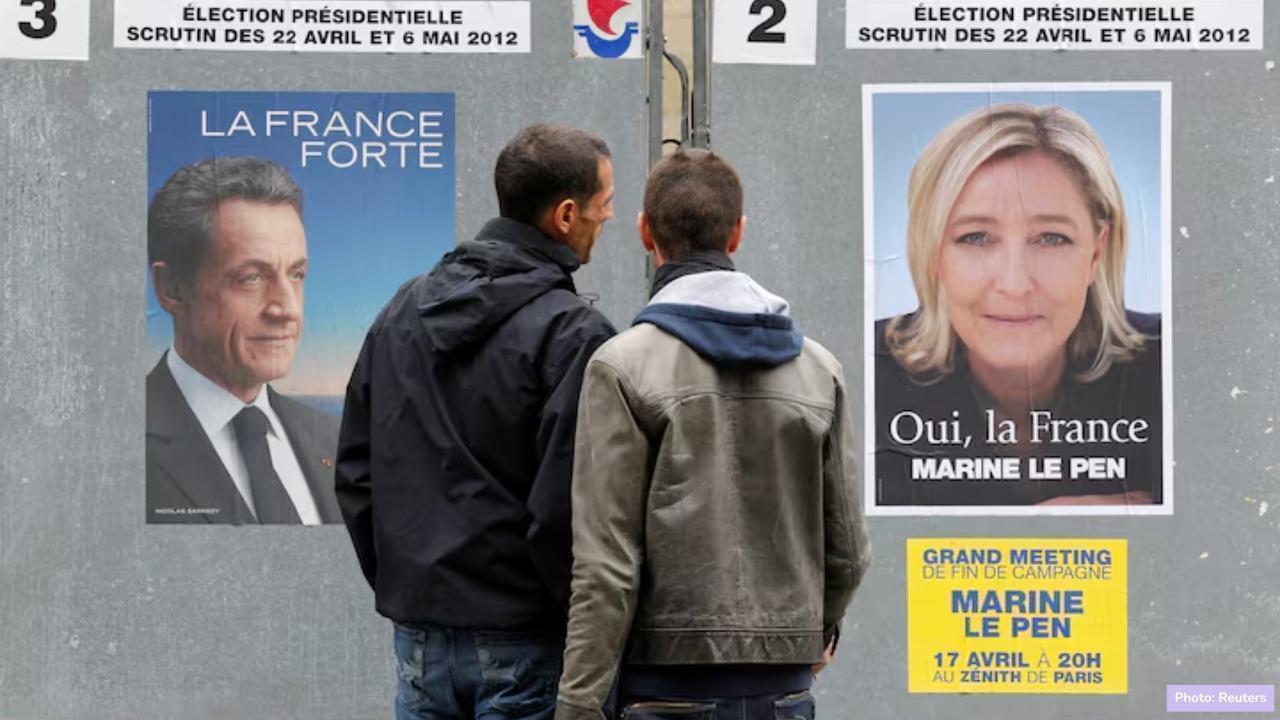
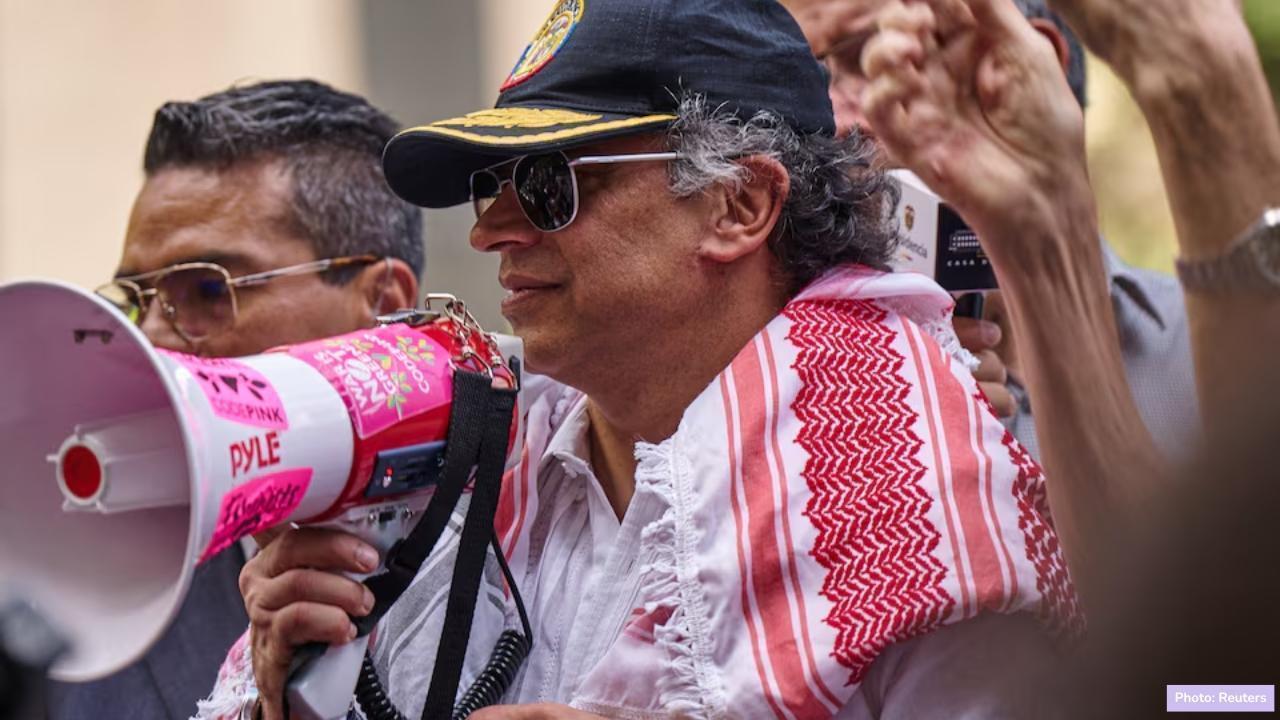

Fed's Miran's Calculation May Overstate Immigration's Impact on Inflation
Experts question Federal Reserve Governor Miran’s claim that reducing immigration will significantly

China's Industrial Profits Grow by 0.9% in Early 2025
China's industrial profits increased by 0.9% from January to August 2025, showing signs of recovery

COP30 Urged to Address Climate Justice and Historical Injustices
Over 240 organizations call on COP30 to link climate justice with reparations for historical wrongs

Tropical Storm Bualoi Hits Philippines: 10 Dead, Thousands Displaced
Tropical Storm Bualoi has caused severe flooding and landslides in the Philippines, leading to at le

ICE Actions Spark Protests and Concerns in U.S. Cities
Recent ICE operations in New York, Chicago, and Boston have led to public outcry, with incidents of

Sarkozy’s Jail Sentence Sparks Debate on Political Justice in France Ahead of Le Pen Appeal
Former President Nicolas Sarkozy jailed 5 years for illegal Libya campaign funds, sparking debate on